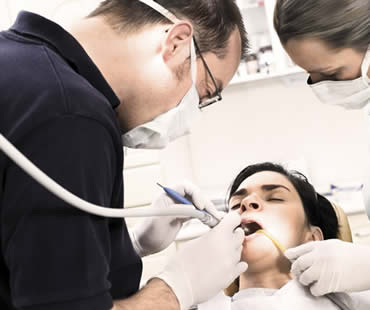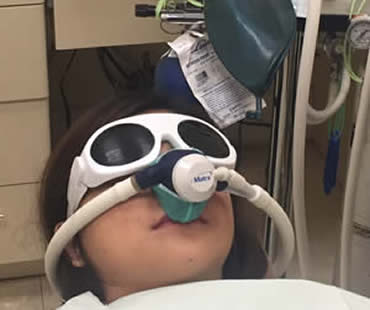
Fear and anxiety shouldn’t keep you from attaining a gorgeous, healthy smile. Modern advances allow dentists to keep patients relaxed and comfortable. With sedation dentistry, patients who experience nervousness can receive the care they need.
Who should consider sedation dentistry?
While anyone can request sedation options during dental treatment, certain people can experience great benefit from this process, including individuals who:
- Can’t handle the sounds and smells of a dental office
- Have difficulty getting numb
- Need extensive repair work
- Suffer from a strong gag reflex
- Went through a dental trauma in the past
What sedation options are available?
Patients who want to relax during dental treatment have several choices:
- Nitrous oxide, also called laughing gas, creates a feeling of peacefulness during your procedure. Patients breathe the gas through a mask over the nose, so the effects disappear once the nitrous oxide is turned off.
- Oral sedation often combines nitrous oxide with a dose of anti-anxiety medication. With oral sedation, patients feel very relaxed and calm while in the dental chair. A responsible adult must accompany you to and from the dentist’s office because the sedative can stay in your system for up to 24 hours.
- IV sedation is the deepest level of relaxation offered by most dentists. Medication is administered intravenously for maximum benefit.
Is sedation dentistry safe?
Absolutely. Throughout the procedure, the dental team will monitor your vitals and make sure you are comfortable. Patients will still be able to respond to any questions, but remember little about the actual procedure.
Will I be unconscious during my appointment?
With sedation dentistry, patients are actually awake but completely relaxed. And unlike general anesthesia, patients breathe without the use of tubes under dental sedation.
Sedation dentist in Longview

If you experience fear about going to the dentist, you’re not alone. Studies show that about 50% of adults experience some level of fear about dental visits, with 5% of those suffering from severe anxiety. However, patient’s wishes for a nice smile and good oral health allow them to overcome their fears and visit their dentist in spite of their qualms.
These are some techniques that many patients use that enable them to get through their dental appointments successfully:
- Using internal resources – telling yourself you can do it even though you are nervous
- Prayer – relying on a higher power to help you through the treatment
- Self distraction – singing to yourself or playing mental games to keep your mind off of what’s happening
- Distancing – convincing yourself that any pain feels like something else, such as numbness
- Optimism – focusing on what’s ahead after your appointment is over
In fact, optimism seems to be one of the biggest keys to overcoming your dental fears. Patients who use this method have been shown to visit the dentist more regularly than other patients who suffer from anxiety about dental treatment. Studies also reveal that humor is another important part of dealing with dental visits. Humor can break down psychological barriers, and allow the patient to feel more comfortable in their interactions with the dentist and staff. An atmosphere of humor tends to reduce stress and increase a sense of well-being and satisfaction in a potentially nervous situation.
However, if none of these techniques work for you, sedation dentistry is a option to consider. At Scott Distefano, DDS we offer a variety of sedation options.
Whatever methods you implement to help you through your dental visit, the most important thing is sticking with it and returning again for your next visit. Your dental health is dependant upon regular dentist’s care.
Dentist in Longview for patients with dental phobias.

If you are about to undergo a dental therapy that necessitates the use of sedation dentistry, especially IV sedation, there are definitely some important questions you should ask your dentist prior to the procedure. Remembering to ask these questions can be difficult, especially if you are feeling anxious or ill at ease with regard to the treatment.
Use this guide to give you some of the most important questions you might not have thought of or remembered to ask:
- What type of sedation will I be receiving?
- What risk factors – even rare ones – are associated with this type of sedation?
- How long will the treatment take, and during how much of that time will I be sedated?
- How will the sedation be administered?
- Who will give me the sedation and monitor it during my treatment?
- What safety measures do you have in place in case of any medical emergency?
- What would happen in the case of a cardiac emergency or a seizure?
- Who is trained in CPR and other life-saving skills?
- What kind of preparations do I need to make prior to my treatment?
- Should someone accompany me to be present during the treatment?
- How soon following treatment will I feel awake and alert?
- May I drive myself home afterward?
- What kind of pain can I expect after my treatment?
- How will I manage my discomfort?
- What kind of aftercare does my particular treatment require?
- What signs should I look for that would lead me to contact you for a follow-up?
Talk to Longview sedation dentist Dr. DiStefano to get the answers to questions like these and any others you may have prior to receiving sedation dentistry.

If you avoid getting dental care because of the anxiety and fear of going to the dentist, you are not alone. It is estimated that forty million Americans don’t seek regular dental care because they are uncomfortable or afraid of going. Sedation dentistry has been developed to manage the pain and anxiety of dental visits, while still providing patients with the ability to respond to verbal commands and physical stimulation.
Here are some guidelines to help you determine if sedation dentistry might help you:
• You are fearful about dental instruments and procedures.
• Local anesthetics have not had a numbing effect on you in the past.
• Your gag reflex is overly sensitive.
• You have a fear of shots or needles.
• The noises, tastes, and odors associated with dentistry bother you a great deal.
• You have extremely sensitive teeth.
• Your dental problems are complicated, or you need to have several procedures in a single visit.
• You have experienced traumatic dental experiences in the past.
• Health issues such as neck or back pain or TMJ make it uncomfortable for you to sit in the dentist’s chair or open your mouth for extended periods.
Putting off dental care is not recommended because it can result in more serious problems or invasive procedures later. If some of the characteristics above describe you, consult your dentist about ways to help you relax and become more comfortable with checkups. Sedation dentistry techniques like IV, oral, or inhaled sedation may be just what you need to allow you to confidently seek dental care on a regular basis.
If you live in the Longview area contact us today
Sometimes it is necessary to sedate patients during dental procedures to allow them to be more comfortable and to decrease their anxiety. The two methods that dentists typically use are general anesthesia and IV sedation. Let’s learn the differences between these two types of sedation, and more specifics about most dentists’ preferred method of IV sedation.
IV stands for intravenous, and means the medicine is administered through an injection into the veins. It causes you to become very sleepy and unable to feel pain, but you are aware of what’s happening around you and are even able to follow instructions. On the other hand, general anesthesia requires inhaling sedation gas through a mask. This causes total unconsciousness, so that you are unaware of anything going on around you and experience no pain.
Many dentists prefer IV sedation because you can follow commands if needed, and the medication levels can be adjusted easily depending on your oxygen levels, blood pressure, and pulse. IV sedation does impair you enough that you should arrange help with transportation home after the procedure because you will be groggy, and you may experience some nausea. Other than those possible side effects, there are really no other issues to worry about with this type of sedation. IV sedation is considered to be a safe, fast, and painless type of anesthesia when it is necessary during dental treatment.
Longview sedation dentistry

One of the most commonly used sedatives in dentistry is nitrous oxide, often referred to as laughing gas. It provides an effective technique in sedation dentistry, allowing patients to feel carefree and happy and pain-free. If used correctly by qualified dentists, nitrous oxide is a safe and valuable sedative.
Nitrous oxide is typically used when patients experience mild to moderate anxiety or fear when seeing the dentist for treatment. The gentle sedative properties of this gas helps patients who are not in extreme panic, but simply need calming.
One appealing thing about nitrous oxide is that it is administered by inhaling it through a mask placed over the nose. There are no needles required, which is a great benefit to many nervous patients. Another plus is that patients remain awake and aware of the environment during treatment, but are no longer anxious or upset about what is happening.
Some additional benefits of nitrous oxide include:
- The sedation level may be adjusted at any time during treatment.
- Since the healthcare professionals have control over the nitrous oxide at all times, it is a very safe choices and nearly impossible to overdose.
- It works quickly, with the calming effects taking place in under three minutes of being administered.
- Lengthy or complicated dental procedures can be performed while the patient is content and often unaware of the time spend in the dental chair. This also increases the dentist’s ability to perform multiple procedures in one visit.
- Nitrous oxide is safe for patients with medical conditions like heart disease, diabetes, and epilepsy.
Sedation dentist in Longview








